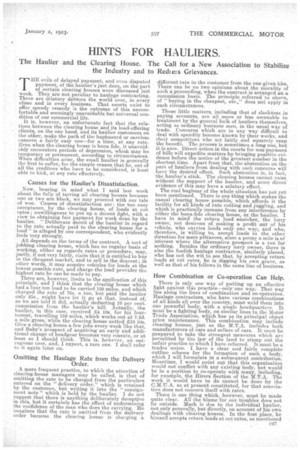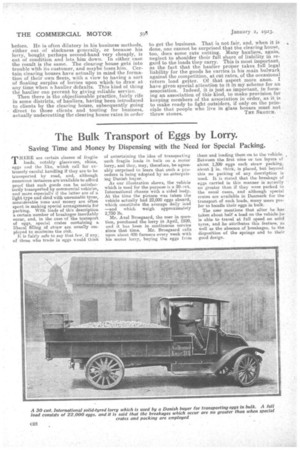HINTS FOR HAULIERS.
Page 13

Page 14

If you've noticed an error in this article please click here to report it so we can fix it.
The Haulier and the Clearing House. The Call for a New Association to Stabilize the Industry and to Red] ess Grievances.
THE evils of delayed payment, and even disputed payment, of the haulier's just dues, on the part of certain clearing houses were discussed last week. They are not peculiar to haulage contracting. There are dilatory debtors the world over, in every clime and in every business. That courts exist to offer speedy remedy is the outcome of this uncomfortable and seemingly unavoidable but universal condition of our commercial life.
It is, however, an unfortunate fact that the relations between the clearing house and its load-offering clients, on the one hand, and its haulier customers on the other, make the path of the haphazard or careless concern a fairly easy one—for a time, at any rate. Even when the clearing house is bona fide, it unavoidably encounters periods of depression, which may be temporary or permanent, according to circumstances. When difficulties arise, the small haulier is generally the first to suffer, for the simple reason that he out of all the creditors who have to 136 considered, is least able to kick, at any rate effectively.
Causes for the Haulier's Dissatisfaction.
Now, bearing in mind what I said last week about the folly of tarring all clearing houses because one or two are black, we may proceed with our tale of woe. Causes of dissatisfaction are : the too easy acceptance, by the clearing -house, of loads at cut rates ; unwillingness to put up a decent fight, with a view to obtaining fair payment for work done by the haulier. "Deliberate deceit of the haulier in regard to the rate actually paid to the clearing house for a • load" is alleged by one -correspondent, who evidently feels very strongly. .
All depends on the terms of the contract. A sort of jobbing clearing house, which has no regular basis of working, either as regards rates or procedure, may, iuetly, if not very fairly, claim that it is entitled to buy in the cheapest market, and to sell in the dearest ; in other words, it may .acquire vehicles for loads at the lowest possible rate, and charge the load provider the highest rate he can be made to pay.
Thare are, however, limits to the application of this principle, and I think that the clearing house which had a four-ton load to be carried 150 miles, and which charged the rate of 75s. a ton, but paid the haulier only 25s,, might have let it go at -that, instead of, as we are told it did, actually deducting 10 per cent. commission from the haulier's bill. Actually, the haulier, in this ease, received £4 10s. for his four tonner, travelling 150 miles, which works out at 7.2d.a mile Voss, while the clearing house netted £10 10s. Give a clearing house a few jobs every week like that, and Baby's prospect of acquiring an early and additional change of headgear becomes very roseate, or at least so I should think. This is, however, an outrageous case, and, I expect, a rare one. I shall refer to it again later on.
Omitting the Haulage Rate from the Delivery Order.
A more frequent practice, to -which the attention of clearing-house managers may be ealled, is that of omitting the rate to be charged from the particulars entered on the "delivery order," which is retained by the customer, but writing it into the "consignment note" which is held by the haulier. I do not suggest that there is anything deliberately deceptive in this, but it certainly has the effect of undermining the confidence of the man who does the carrying. -He imagines that the rate is omitted from the delivery order because the clearing house is charging a
different rate to the customer from the one given him. There can be no two opinions about the morality of such a proceeding, when the contract is arranged Qn a commission basis. The principle referred to above, of "buying in the cheapest, etc.," does not apply in such circumstances.
These little matters, including that of slackness in paying accounts, are all more or less amenable to treatment by the general bulk of hauliers themselves, acting as ordinary business men, in the usual way of trade. Concerns which are in any way difficult to deal with speedily become known by their works, and their competitors who act fairly and squarely reap the benefit. The process is sometimes a long one, but it is sure. Direct action in the courts for non-payment of bills will expedite matters by bringing positive evidence before the notice of the greatest number in the shortest time. Apart from that, the abstention on the part of hauliers from. dealing with such concerns will have the desiredeffect. Such abstention is in fact, the haulier's stick. The clearing houses cannot exist, without the support of the haulier, and some direct evidence of this may have a salutary effect.
The real bugbear of the whole situation has not yet been mentioned. There is one thing which makes the casual clearing house possible, which affords it the facility for all kinds of rate cutting and juggling, and which is practically-immune from any interference by either the bona-fide clearing house, or, the haulier. I have in mind the return load snatcher, the lorry owner, not desirous of making a profit out of his vehicle, who carries loads only one way, and who, therefore, is willing to, accept loads in the other direction for mere pittances, since a penny a mile is of interest where the alternative prospect is a run for nothing. Besides the ordinary lorry owner, there is also the foolish haulage contractor, similarly placed, who has not the wit to see that, by accepting return loads at cut rates, he is digging his own grave, as well as that of his fellows in the same line of lousiness.
How Combination or Co-operation Can Help.
There is only one way of putting up an effective fight against this practice--only.one way. That way lies along the lines of combination and co-operation. Haulage contractors, who have various combinations of all kinds all over the country, must weld them into one powerful body, with a single headquarters. It must be a fighting body, on similar lines to the Motor Trade Association, which -has as its principal object price maintenance. This combination may include clearing houses, just as the M.T.A. includes both manufacturers of cars and sellers of cars. It must be prepared to take the strongest measures which are permitted by the law of the land to stamp out the unfair practice to which I have referred. It must be a trades union. I have a clear and fairly complete outline scheme for the formation of such a body, which I will formulate in a subsequent contribution. Meantime, I would point ont that this organization would not conflict with any existing body, but would be in a position to eo-operate with many, including, for example the Hirers Section of the M.T.A. The work it would have to do cannot be done by the OMIT. A. as at present constituted, for that association does not concern itself with rates.
There is one thing which, however, must be made quite clear. All the blame for our troubles does not lie outside. Much is due to the individual haulier, not only generally, but directly, on account of his own dealings with clearing houses. In the first place, he himself accepts return loads at cut rates, as mentioned
before. He is often dilatory in his business methods, either out of slackness generally, or because his lorry, bought perhaps second-hand very cheaply, is out of condition and lets him down. In either, case the result is the same. The clearing house gets into trouble with its customer, and maybe loses him. Certain clearing houses have actually in mind the formation of their own fleets, with a view to having a sort of floating surplus of lorries upon which, to draw at anytime when a haulier defaults. This kind of thing the haulier can prevent by giving reliable service.
Then there is the objectionable practice, fairly rife in some districts, of hauliers, having been introduced to clients by the clearing house, subsequently going direct to those clients and touting for business, actually underoutting the clearing house rates in order
to get the business. That is not fair, and, when it is done, one cannot be surprised that the clearing house, too, does some rate cutting. Many hauliers, again, neglect to shoulder their full share of liability in regard to the loads they carry. This is most important, as the fact that the haulier proper takes full legal liability for the goods he carries is his main bulwark against the competition, at cut rates, of the occasional return load getter. Of that aspect more anon. I have given special attention to it in my scheme for an association. Indeed, it is just as important, in forming an association of this kind, to make provision for keeping members of the association in order, as it is to make ready to fight outsiders, if only on the principle that people who live in glass houses must not
throw stones. THE SKOTCH.






























